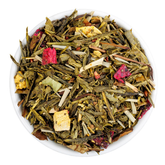Roses have been used in herbal medicine for centuries and are full of healthful properties. Different teas may use different parts of the rose plant as ingredients in their blends: rose petals are often added to light, mellow teas to add a floral note, while rosehips are often added to fruit-forward blends to add sweetness and tartness. While rose petals and rosehips differ in taste and in the particular benefits they confer, they’re both healthy, tasty additions to herbal and caffeinated blends.
Rose petal tea benefits
Adding rose petals to loose leaf tea gives the tea a mellow, floral flavor. Some of the many benefits of rose petals include:
1. Reducing anxiety
A cup of rose tea can help to soothe anxiety and reduce stress. Studies show that rose petals can have a relaxing effect, helping to lower stress levels and encourage sleep. Rose petals are often included in flavored tea blends that contain anxiety-fighting L-theanine, or soothing herbal blends, with other therapeutic ingredients like lavender and chamomile.
2. Improving digestion
Rose petals have been used for centuries as a digestive aid in the Middle East, and have been shown to help improve digestion and soothe pesky stomach troubles. When consumed as a tea, rose petals have a mild laxative effects that can help everything go smoothly when it comes to digestion.
3. Soothing cramps
Suffering from period pain? Rose tea can help to provide relief from stress during that time of month. Studies show that rose tea has a soothing effect when it comes to both physical and mental period symptoms, making it a great alternative to painkillers or other over the counter medicine.
4. High in antioxidants
Both rose petals and rosehips are high in antioxidants. Antioxidants help to ward off harmful free radicals and promote cellular health within the body. They can also help to prevent degenerative diseases like cancer. If you’re looking to up your antioxidant intake, you can’t go wrong with a cup of tea!
5. Contains antimicrobial properties
Rose petals contain antimicrobial properties that can help to protect you against harmful bacteria. This means that a cup of rose tea can help to boost your overall health and wellness and ward off harmful microorganisms before you get sick.
6. Reducing inflammation
Rose flower extract has also been shown to help reduce inflammation. Whether you’re suffering from chronic inflammatory conditions like arthritis or just need help soothing temporary pain, rose tea can help to lessen the symptoms of inflammation.
Rosehip tea benefits
Rosehips are sweet and tart, with a slightly cranberry-like flavor. They’re often added to fruity flavored blends, and are a popular ingredient in many of the herbal teas we carry. Some of the benefits of rosehip tea include:
1. High in antioxidants
Like rose petals, rosehips are also extremely high in antioxidants. Antioxidants help to fight off harmful free radicals and prevent degenerative diseases.
2. High in vitamin C
Rosehips are also extremely high in Vitamin C. Vitamin C has a whole host of health benefits, from boosting the immune system to helping the body absorb iron.
3. Reducing inflammation
Like rose petals, rosehips have also been shown to be effective in reducing inflammation. A cup of rosehip tea can help to soothe aches and pains, including pain from chronic inflammatory conditions like arthritis.
4. Encouraging healthy skin
Rosehips have been shown to encourage healthy skin by improving cell longevity and reducing the signs of aging. Drinking rose tea can also improve your hydration, which has beneficial effects for your skin.
















